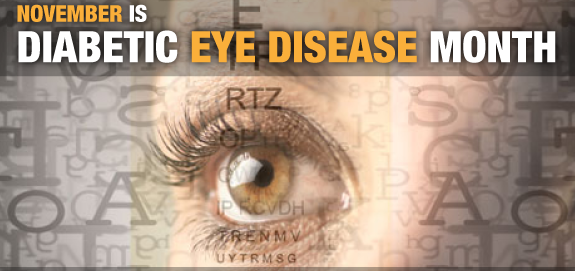
Did you know that diabetes is the leading cause of blindness and very rarely has early warning signs? With November being Diabetic Eye Disease Month, we wanted to give our patients some insight on diabetic eye disease.
Diabetes is a chronic disease that is reaching epidemic proportions in the United States. By 2030, it is estimated that 11 million people will have diabetic retinopathy. Patients’ understanding of the many factors that influence control as well as knowledge of long term complications is vital to reducing the side effects from what can be devastating to vision. Education is vital. The first thing to understand is that insulin, which is created by the pancreas, is what controls the blood sugar in our bodies. An average blood sugar should be under 100 and when it consistently is above that range, it is due to cells in the pancreas losing their ability to produce insulin. Physicians can treat this with oral medications, especially in adult onset diabetes, or injections of insulin which is most often necessary when diabetes occurs in children. The goal is to keep the blood sugars at a safe level in order to prevent damage to the delicate blood vessels in the body.
Diabetes affects the eye by causing leakage of the vessels in the retina, the part of the eye that receives the visual image and creates the “picture”. These vessels provide nutrients and oxygen to the cells of the retina and if they start to leak fluid and blood, those cells become damaged. This is called diabetic retinopathy and leads to loss of vision that can be permanent. Treatment includes laser to help seal the leaking vessels and, in severe cases, surgery called vitrectomy where the blood has to be removed from the back of the eye. It is smart to schedule a yearly comprehensive dilated eye exam as that will increase the likeliness of early detection. Even after a diabetic diagnosis, a yearly eye exam is part of the comprehensive management of the disease to ensure any changes are detected early. Diabetic patients are prone to developing cataracts at an earlier age so these yearly exams are extremely important to maintaining good health.
The most important thing a patient can do to help control their blood sugar is to maintain a healthy lifestyle. One of the biggest changes a patient can make is to stop smoking as smoking can accelerate damage to the blood vessels. Most hospitals, community centers, and other agencies offer diabetic classes where patients can learn how to eat and cook foods that are low in simple sugars and carbohydrates while being high in protein. In addition, these classes can provide information on exercises such as walking and biking to help burn off calories and reduce body fat which further helps control blood sugar. Education and “being part of the process” are vital to avoiding complications with diabetes.
Now is the time to speak with your ophthalmologist about your eye health if you have questions about diabetic retinopathy. Early detection is the best way to potentially save your vision if it is jeopardized by diabetes. Nearly 95% of diabetic eye treatment is successful in preventing blindness if detected early. What are you waiting for? Give us a call today and we’ll be happy to help you in your journey of having the best vision for life. Click here for more information on Diabetic Eye Disease.



